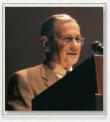Filed Under > In Memoriam
Abraham Tannenbaum Dies; Groundbreaking Theorist in the Field of Gifted Education
Tannenbaum, 90, was on the faculty from the late 1970s until his retirement in 1999 from the former Department of Special Education. In 1983, after years of research, he published the influential five-point “Sea Star” model for identifying children and adolescents who are potentially gifted. His 1983 book Gifted Children: Psychological and Educational Perspectives (MacMillen) is considered one of the most important on the subject.
Tannenbaum broadened the definition of giftedness that was commonly accepted at the time beyond demonstration of intellectual ability or aptitude. He defined giftedness as the ability to perform or produce work “that enhances the moral, physical, emotional, social, intellectual, or aesthetic life of humanity.” Because many gifted people do not end up achieving their full potential, he believed that children and adolescents could only be considered “potentially gifted.” True giftedness, he said, can only be demonstrated in adults who are “critically acclaimed performers or exemplary producers of ideas.”
“He was a major figure and my mentor as well,” said James Borland, Professor of Education and Director of TC’s Gifted Education program, who describes Tannenbaum’s work as “influential and eye-opening.” According to Tannenbaum, giftedness was “the result of a complex web of innate characteristics and environment,” whereas most educators at the time used definitions that “located giftedness in the individual,” Borland said.
Tannenbaum and TC colleague A. Harry Passow, who had launched the field of gifted education at TC in 1955, served as advisers to Borland and Heidi Hayes Jacob, an expert in curriculum mapping and President and founder of Curriculum 21, when they created the Hollingworth Center for the Study of the Gifted in 1981. As director of programs for gifted education and for emotionally disturbed children in what was then the Department of Special Education at TC, Tannenbaum led many research studies focused on gifted and talented students and worked with organizations including the Head Start Program.
His five-point model “influenced and opened the door to looking at a more complex vision of giftedness,” said Lisa Wright, Director of TC’s Hollingworth Center, who was later mentored by Tannenbaum. “Now, in some cases, schools will look at children in a more comprehensive way.”
Tannenbaum believed that to maximize their chances of reaching their full potential, possibly gifted children must be exposed to the broadest possible range of information and experiences in childhood as they develop. That idea suggested radical changes in the way in which gifted children and adolescents should be educated.
“This notion of giftedness was so grounding, and so liberating,” Wright said. It suggested that “you provide enrichments to all children, and see which children respond. He wasn’t going to wait for a kid to have a random encounter with a drum set. He wanted an enriched curriculum for every child, because you never know when you’re going to find a gifted child.”
In addition to measures of general intelligence and aptitude, Tannenbaum’s “Sea Star” model includes “non-intellective” traits such as motivation, commitment, belief in oneself, sound mental health and confidence. He theorized that all the internal and external variables in his definition must be in place in order for a child to be considered potentially gifted. Each may be present to varying degrees, he said, but an abundance of one could not compensate for the complete lack of another.
Tannenbaum also acknowledged the role of “chance” in the development of a gifted child to his or her full potential – factors such as meeting and working with a life-changing mentor, or being faced with a challenge in childhood or adolescence. In addition to being intelligent, talented and hard-working, the child who realizes potential giftedness must, in the end, also be lucky.
Tannenbaum was a teacher in Brooklyn public schools for more than 20 years. He earned a bachelor's degree in English literature from Brooklyn College in 1946, a master's degree in guidance and educational administration at Teachers College in 1948, and a doctoral degree in social and educational psychology at Teachers College in 1960.
Among his many honors, Tannenbaum was awarded a Fulbright-Hayes Professorship in 1968 to serve as a visiting professor at Hebrew University in Jerusalem, and he was a recipient in 1981 of the Hollingsworth Award for research on the gifted and talented, and a recipient of the Distinguished Scholar Award of the National Association for Gifted Children in 1985.
Published Thursday, Jul. 3, 2014
